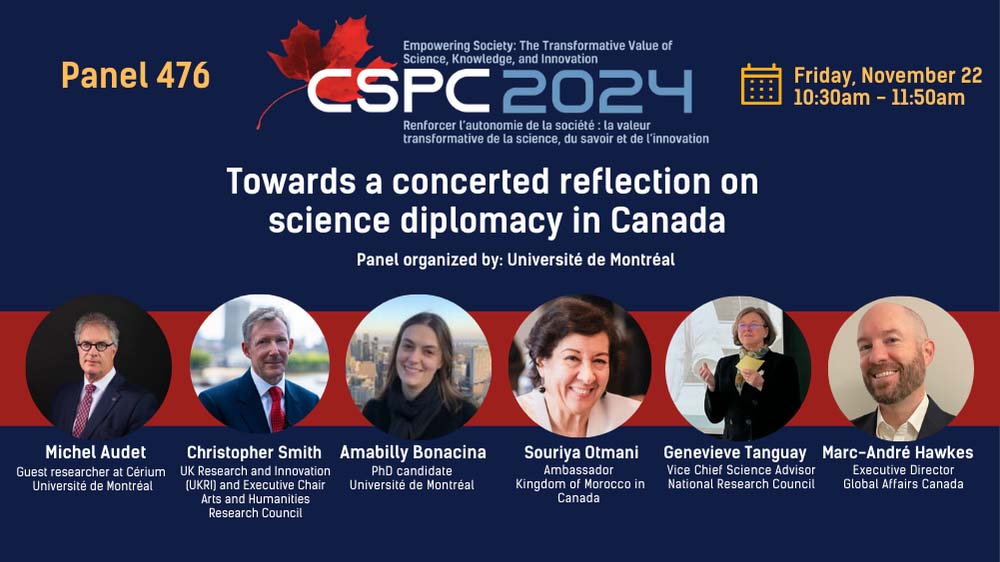Abstract:
During this panel, a reflection will be initiated by collecting comments from different actors of the academic, governmental, diplomatic sectors and civil society sectors on their practice in terms of science diplomacy and what they would like to find in a possible Canadian policy or strategy. It will also discuss the close links that exist with national security issues. The balance between these two visions can have an impact on the vitality of the Canadian research and innovation ecosystem. It is our responsibility to document our practices in this area and to build, thanks to our knowledge, a strong vision which will transform our society of tomorrow and which will send a strong signal to global partners such as Europe or the United States which have already adopted clear positions on science diplomacy.
Summary of Conversations
The panel explored science diplomacy in Canada, emphasizing its role in addressing global challenges. Discussions covered the importance of communication, cooperation, and collaboration across scientific disciplines to tackle issues like climate change, pandemics, and geopolitical shifts. Science diplomacy was highlighted as a tool for sharing research results, fostering national development, and promoting international competitiveness. Participants discussed its application in various contexts, including leveraging science for political influence, facilitating cooperation, and navigating international relations. Examples from Brazil and Morocco showcased how science diplomacy can drive innovation, economic development, and address environmental concerns. The need for a balanced approach that promotes collaboration while safeguarding national interests was also addressed.
Take Away Messages/ Current Status of Challenges
Insights and challenges highlighted during the panel include:
- The necessity of science diplomacy to address global problems and promote international collaboration.
- Navigating the balance between fostering open scientific exchange and protecting national security interests.
- The critical role of communication and transparency in building trust and mutual understanding in international collaborations.
- Addressing inequalities in international research collaborations to ensure equitable partnerships.
- The need for adaptable strategies in science diplomacy that consider diverse cultural and political contexts.
- Overcoming administrative and bureaucratic obstacles to facilitate international research collaborations.
- Countering the influence of populism and misinformation through effective science communication.
- Ensuring reciprocal benefits and guaranteeing access to resources and infrastructure in international collaborations
Recommendations/Next Steps
Proposed actions and strategies include:
- Developing national strategies for science diplomacy that align with national priorities and global challenges.
- Strengthening communication channels between scientists, diplomats, and policymakers.
- Promoting researcher mobility and facilitating visa processes to encourage international collaboration.
- Investing in research infrastructure and resources to support scientific diplomacy initiatives.
- Fostering international research networks and collaborations to address shared challenges.
- Developing educational programs and training for scientists and diplomats in science diplomacy.
- Engaging with international organizations and initiatives to promote science diplomacy.
- Establishing clear ethical guidelines for science diplomacy activities to ensure responsible and transparent practices.
* This summary has been generated with the assistance of AI tools


